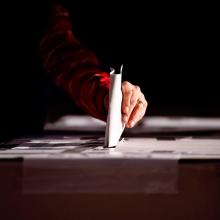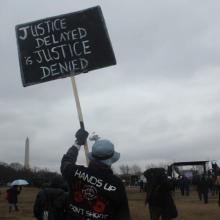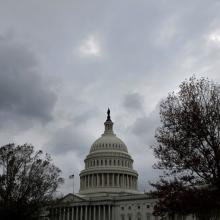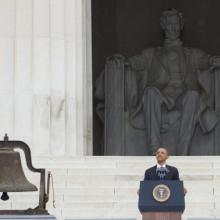voting rights act
As many people in the United States prepared for the holiday weekend, the Supreme Court’s conservative 6-3 majority upheld two laws that restrict voting in Arizona. The first law the court upheld disenfranchises voters if they cast a ballot in the wrong precinct, invalidating not just their votes for local races, but also their entire ballot, including votes cast in U.S. presidential elections or Senate races, even though all eligible voters in Arizona can vote in those races regardless of the district where they live. The other law prohibits most people from delivering another voter’s absentee ballot to a polling place, making it a crime for anyone but a family member or caregiver to do so.
THE RIGHT TO VOTE, a foundation of our democracy and a fundamental attribute of citizenship, is under serious threat. In recent years, attacks on the integrity of the electoral system—the gutting of the Voting Rights Act, disinformation campaigns, foreign interference, and more—have weakened its overall infrastructure and cast doubt upon its results. Now we’re seeing repeated attempts, through propaganda and other means, to further undermine the system and discredit in advance the results of the 2020 election.
The president has attempted to co-opt real concerns about the upcoming election, claiming without evidence that it might be “stolen” as a result of fraud tied to vote-by-mail. His efforts deflect attention away from the ways that voter suppression efforts already underway pose a real danger, both to people seeking to exercise their hard-won right to vote and to the integrity of the electoral system itself.
As many have pointed out, there are numerous ways internal or external forces could call the results of the election into question: declaring a state of emergency that disrupts voting, delaying Election Day, interference by hostile foreign powers, tampering with voting machines or databases, and more. All of these represent legitimate threats, but perhaps the most likely scenario is that rampant voter suppression tactics impede enough voters in key battleground states to alter the presidential election outcome and which party controls Congress.
IN 2016, VOTERS faced extensive efforts to make voting more difficult, particularly for people of color and those who are poor. These efforts at voter suppression occurred as a result of GOP gains in governors’ races and state legislatures while Barack Obama was president—and also as a result of the Supreme Court gutting a key provision of the Voting Rights Act in 2013.
Between those two factors, 23 states—including some key battlegrounds in the presidential election—had new voter restrictions in place for the 2016 election. Examples include laws that eliminated polling places or moved them to less accessible locations, reduced polling hours, tightened voter-ID requirements, “purged” voter rolls, and reduced early voting and Sunday voting, which are popular among minority voters in certain regions.
As we approach the 2018 midterms, we need to protect the right to vote for citizens of all races, economic levels, and political persuasions. This is an imago dei issue: If we believe that all human beings are created in the image of God (Genesis 1:26), then efforts to prevent some of God’s children from exercising their franchise must be opposed as a matter of fidelity to our faith. It’s also a Matthew 25 issue: If we believe that how we treat people living in poverty and those who have been caught up in the system of mass incarceration is how we treat Christ himself, then we have a clear Christian mandate to ensure that society’s most vulnerable can exercise the right to vote.
In-person voter fraud is vanishingly rare, to the tune of only 31 documented cases out of 1 billion ballots cast between 2000 and 2014. To put it another way, the odds that any given person will attempt in-person voter fraud are something like 1 in 32 million, significantly lower than the odds of being struck by lightning. Twice.
Crying out “no justice, no peace,” crowds joined the Rev. Al Sharpton in a weekend march towards the Martin Luther King Jr. Memorial, vowing not to let President-elect Donald Trump turn back strides made by the civil rights leader.
The mostly African-American throng — smaller than the thousands expected, due to the steady rain — heard from civic and religious leaders about key areas of concern: health care, voting rights, economic equality, and police brutality and reform.
Back when so many thought Hillary Clinton would be the next president, two dozen African-American leaders wrote to the Democratic nominee, asking her to explain her policies related to the poor and the police.
African Methodist Episcopal Bishop Frank M. Reid III said black clergy will make some of the same demands of President-elect Donald Trump.
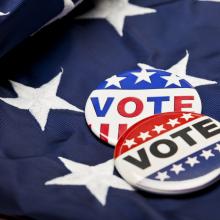
Image via Derek Hatfield / Shutterstock.com
North Carolina’s requirement that voters present photo identification at the polls has long been called a disguised attempt to suppress the black vote. The Rev. William Barber and Jonathan Wilson-Hartgrove have called voting rights rollbacks, like the one in North Carolina, the “second career of James Crow, Esq.” for their racially discriminatory impact.
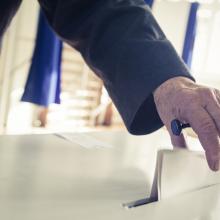
Image via Alexandru Nika / Shutterstock.com
Are voting restrictions about voter fraud, or are they just a ruse to suppress likely Democratic voters?
Since 2010, conservatives have instituted voting restrictions in 21 states, the most well-known of which are laws that require photo IDs at the polls.
Today is the first time I have ever been arrested in Washington, D.C. I came for the same reason Southern political leaders petitioned President Grant to send troops in the 1870s — for the same reason Dr. King called upon Presidents Kennedy and Johnson to enforce federal law in the 1960s. I came because the interposition and nullification of extremists is blocking a Third Reconstruction in America today.
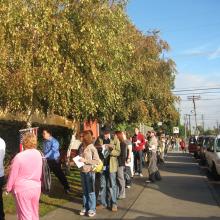
Image via bunnicula / flickr.com
Hillary Clinton’s presidential campaign is joining with the Democratic Party to sue Arizona after the state’s fiasco of a primary election. Some voters in the primary waited up to five hours to vote.

Image via flysnowfly / Shutterstock.com
The Supreme Court ruled unanimously to uphold the traditional interpretation of “one person, one vote,” in which all residents — not just eligible voters — count toward population totals for electoral districts, reports Talking Points Memo. The opinion in the case, Evenwel v. Abbott, was authored by Justice Ruth Bader Ginsburg. Justices Samuel Alito and Clarence Thomas wrote concurring opinions.
This week, as the five candidates still in the running for the White House turned their campaigns westward; vying for top spots in Arizona, Idaho, and Utah, pundits wondered aloud if voter suppression would make an impact on the general election. At the same time, miles-long lines formed in Arizona’s Maricopa County, the most populous and racially diverse county in the state. According to reports, lines of voters were still winding around blocks and parking lots even as news stations were projecting winners. Why? Because Maricopa County had reduced its polling places by 70 percent between 2012 and 2016, from 200 polling places to 60. How could they do that?
1. WATCH: Jon Stewart and ‘The Daily Show:’ 9 Essential Moments
The New York Times offers this great video retrospective from 16 years of Jon Stewart nailing it four nights a week. He will be missed. #JonVoyage
2. The Women of the Protest Line
Almost a year after Michael Brown’s death, Amy Pedersen writes on how the movement in Ferguson, Mo., and beyond is largely a movement of women. “When you watch this weekend from afar, know that you are watching the movement of women; that we are on the street because that is where God is moving. … We are women and because we are women, we know how to be brave.”
3. A Haunting Timelapse of the 2,058 Nuclear Detonations from 1945 to 1998
This week marks the 70th anniversary of the nuclear bombings of Hiroshima and Nagasaki, ushering in the Nuclear Age. Popular Mechanics provides this arresting visual of detonations since then. Note: Keep an eye on the tickers for Russia and the U.S.

The Rev. James C. Perkins. Photo via Adelle M. Banks / RNS
Fifty years after the signing of the Voting Rights Act, the president of the Progressive National Baptist Convention said black churches will be redoubling efforts to maintain access to the ballot box.
The act, signed into law by President Lyndon B. Johnson 50 years ago Aug. 6, was a crowning achievement of the civil rights movement. But in 2013 the Supreme Court invalidated key provisions, and many states, nearly all of them under Republican control, passed new voting restrictions that critics say target minority voters.
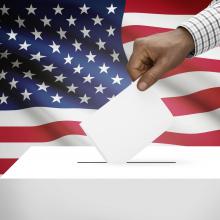
Image via Niyazz/Shutterstock
Today is the 50th anniversary of the landmark Voting Rights Act, passed Aug, 6, 1965. The act, signed into law by President Lyndon B. Johnson, created key provisions to prevent racial discrimination in voting laws.
The Voting Rights Act has been called "the single most effective piece of civil rights legislation ever passed by Congress."
Today's anniversary is a bittersweet commemoration. In 2013, the Supreme Court struck down Section 4, which had required Alabama, Alaska, Arizona, Georgia, Louisiana, Mississippi, South Carolina, Texas, and Virginia to seek federal approval before imposing changes to voter laws.
NC NAACP vs. McCrory is a necessary interruption to the institutionalized racism that is killing black and brown people. For all the talk around “black lives matter,” Rev. Barber warns, we are in danger of only affirming that black death matters if we accept that the martyrs of Charleston deserve nothing more than the removal of a Confederate flag from their state house. Yes, the flags should come down. But if they go away while the unjust laws remain, then it may be even harder for us to see that the root of injustice is in an imbalance of power.
And the fundamental power of citizenship in this country is still the franchise.
The white ministers didn’t fly down to Alabama in January, when Sheriff Jim Clark clubbed Annie Lee Cooper outside of the county courthouse, nor in February when a state trooper fatally shot twenty-six-year-old Jimmie Lee Jackson in the stomach for trying to protect his mother after a civil rights demonstration.
But on Bloody Sunday everything changed. At 9:30 p.m. on March 7, 1965, ABC news interrupted a broadcast to show hundreds of black men, women, and children peacefully crossing the Edmund Pettus Bridge toward Montgomery and a sea of blue uniforms blocking their way. The marchers were given two minutes to disperse, and then the screen filled with the smoke of tear gas, police on horseback charging the screaming crowd, burly troopers wielding billy clubs and bullwhips, a woman’s hem rising up over her legs as a fellow marcher attempted to drag her away to safety.
Overnight the nation’s eye turned toward Selma. Rev. Martin Luther King sent a telegram to hundreds of clergy that Monday, urging them to leave their pulpits and join him in Alabama to march for justice. Some supporters, like the reporter George Leonard, packed their things immediately after watching the newscast from Selma.
“I was not aware that at the same momemt ... hundreds of these people would drop whatever they were doing,” Leonard wrote later.
“... That some of them would leave home without changing clothes, borrow money, overdraw their checking accounts, board planes, buses, trains, cars, travel thousands of miles with no luggage, get speeding tickets, hitchhike, hire horse-drawn wagons, that these people, mostly unknown to one another, would move for a single purpose to place themselves alongside the Negroes they had watched on television.”
Selma changed the course of history by paving the way for the passage of the Voting Rights Act, but its impact didn’t end there. The spirit of Selma rippled outward, forever changing those who made the long journey to Alabama — including a white minister from Washington, D.C., named Rev. Gordon Cosby.
With the 50th anniversary of Bloody Sunday this weekend, America was reminded how this small city helped bring sweeping change to the nation.
But while Selma might have transformed America, in many ways time has stood still in this community of 20,000 that was at the center of the push that culminated with the Voting Rights Act of 1965.
Dallas County, of which Selma is the county seat, was the poorest county in Alabama last year. Selma has an unemployment rate of 10.2 percent; the national rate is 5.5 percent.
More than 40 percent of families and 67 percent of children in the county live below the poverty line. The violent crime rate is five times the state average.
The Birmingham News called the region, known as the Black Belt because of its rich soil, “Alabama’s Third World.”
The images of that day in 1965 were quickly seared into the American consciousness: helmeted Alabama state troopers and mounted sheriff’s possemen beating peaceful civil rights marchers in Selma, Ala., as clouds of tear gas wafted around the Edmund Pettus Bridge.
On March 7, 1965 — a day that would become known as “Bloody Sunday” — 600 marchers heading east out of Selma topped the graceful, arched span over the Alabama River, only to see a phalanx of state and local lawmen blocking their way on U.S. Highway 80.
The police stopped the marchers, led by Hosea Williams of the Southern Christian Leadership Conference and John Lewis, chairman of the Student Nonviolent Coordinating Committee, and ordered them to disperse. Then they attacked. Lewis, one of 58 people injured, suffered a skull fracture. Amelia Boynton Robinson, then 53, was beaten unconscious and left for dead, her face doused with tear gas.
Photos of that terrible day were seen around the world. Historians credit the beatings, and the public outrage that followed, as a catalyst for the passage of the Voting Rights Act.
“I do know the voice of God.”
That’s what David Oyelowo, the actor who beautifully portrays Dr. Martin Luther King Jr. in the new film Selma, told me last night. It’s that voice, he said, that called him to play the role.
I was at the December preview of Selma in Washington, D.C., and then took my family to see it at an early showing on Christmas day. I sometimes respond emotionally to films, but Selma made we weep. It also made me grateful that for the first time in 50 years, a big studio had finally made a film about Dr. Martin Luther King Jr. and the people in the movement around him in Selma. I believe this movie, unlike most others, could actually change the nation’s conversation about race and reconciliation at a crucial time, perhaps even providentially.
On the premiere night, I met David Oyelowo, who spoke publically after the film about his faith. I don’t hear that kind of talk very much in D.C., but David was open and forthright, saying that playing the great Christian leader became part of his personal calling as a Christian.
In our conversation afterward, I asked David what he meant by those words. His answer prompted me to ask for an interview with him before the film, which debuts this weekend, came out. He and I talked last night (listen to the full interview below).
Editor's Note: The following is a transcript of President Barack Obama's speech from the Lincoln Memorial on the 50th Anniversary of the March on Washington.
We rightly and best remember Dr. King’s soaring oratory that day, how he gave mighty voice to the quiet hopes of millions; how he offered a salvation path for oppressed and oppressors alike. His words belong to the ages, possessing a power and prophecy unmatched in our time.
But we would do well to recall that day itself also belonged to those ordinary people whose names never appeared in the history books, never got on TV. Many had gone to segregated schools and sat at segregated lunch counters. They lived in towns where they couldn’t vote and cities where their votes didn’t matter. They were couples in love who couldn’t marry, soldiers who fought for freedom abroad that they found denied to them at home. They had seen loved ones beaten, and children fire-hosed, and they had every reason to lash out in anger, or resign themselves to a bitter fate.


